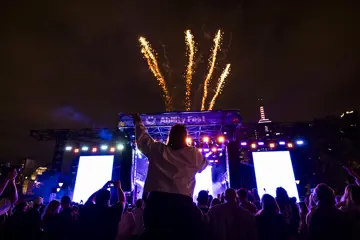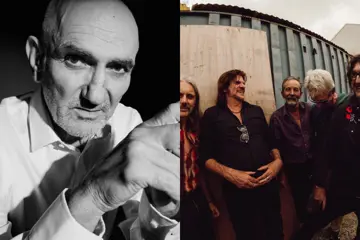You have to laugh or else you’ll cry, so the saying goes. It’s a sentiment that playwright and actor Nakkiah Lui knows well. As one of the writers and stars of the ABC’s Aboriginal sketch show Black Comedy, she's shown a talent for using politically edged humour to untangle the unresolved tensions that persist between First Nations communities and this country’s colonial past.
Premiering this week at Malthouse Theatre, Blaque Showgirls – Lui’s campy musical satire based on the cult ‘90s grindathon, Showgirls (which she proudly admits is one of her all-time favourite films, despite its reputation as one of the worst movies ever made) – brings her trademark combo of laugh-out-loud wit and political firebranding to the stage.
“I think issues need to be accessible and for me, as an actor and a writer, what I want to do is make room for the conversation,” Lui explains. “I don’t have any answers, but I do have a lot of questions. I strongly believe that action comes from thought, so getting my thought process out there, in a way that can be easily understood, is a way of creating a space for those questions to exist. What I particularly like about comedy is that it’s very intuitive. It goes beyond cold logic and reaches for the heart, without wanting to sound too cheesy about it. I think that’s why Black Comedy and my stage works have had such a great reception because ultimately people do want to engage with these issues, they want to question things and look for change.”
When I speak to the former Law student turned award-winning theatre-maker, an unlikely focal point for the debate about Aboriginal reconciliation has been on her mind. A campaign to move triple j’s Hottest 100 from its traditional fixture on Australia Day, in recognition of the date’s devastating significance for Aboriginal Australians, has been building momentum.
Don't miss a beat with our FREE daily newsletter
Lui believes that anchoring this fraught and confronting subject to something mainstream, makes accepting the cultural cataclysm of white settlement a less difficult process. “There’s a whole group of people – not just the Aboriginal community, but people who have values that are inclusive – who want the date changed. It would be such a clear signifier that as a country we want a future without discrimination,” Lui shares. “Australia has a huge issue with acknowledging its past, so changing the date would also be a simple way of us consciously recognising that history.”
"Australia has a huge issue with acknowledging its past, so changing the date would also be a simple way of us consciously recognising that history."
In addition to her work bringing Aboriginal stories to both stage and screen, Lui has also become a prominent figurehead and activist, championing the Indigenous voice on current affairs programs like The Drum and Q&A. As with her theatre and television work, she sees her advocacy as a way of making the acknowledgment of Australia’s shameful past easier to bear. “The trauma of colonialism is just so big, I don’t think people really know how to engage with it,” she observes. “Colonisation is often painted as this romanticised journey of discovery and that divorces us from looking more closely at how that past connects to our present. I was doing some research for a play and I found out that my great great grandmother had died in a massacre, and that was really shocking to me because generationally that still feels really close.
“It also made me appreciate how much our legal systems are built upon colonial ideals, and even how our present day multicultural identity is most often seen as being rooted in the values of whiteness. It’s like ‘we’re ok with your culture, as long as you’re willing to be like us. We’ll tolerate your Aboriginality, as long as it doesn’t inconvenience our society.’ That is why things have really not gotten better for Aboriginal people over the last few decades. Incarceration rates are going up, our life expectancy isn’t, we have an epidemic of mental illness, and the people we’re losing to suicide – I’ve lost quite a number in my own family. It’s an outrage, but one we have to look in the eye if we’re going to move forward.”
Using comedy as an inroad to subjects that are undeniably bleak isn’t a new premise, but Lui’s approach, using humour to unpick the story of contemporary Aboriginality, has offered a refreshing perspective on the topic. Blaque Showgirls is a perfect example of Lui’s talent for infusing a political message into a laugh riot. “The gaze of the movie is beautifully strange. Elizabeth Burkley is acting for her life and I love how ridiculously but unconsciously camp it is while being so heterosexually extravagant. But there are also some interesting observations about cultural appropriation, so I thought there was real potential to adapt it. Plus it felt like kind of an F-you to those big companies wanting me to do an Aboriginal adaptation of some serious work from the traditional canon.”
Using social injustice to get some laughs could be viewed as trivialising serious issues, but being funny doesn’t devalue the subject; it repositions its context, Lui believes. “I’ve written plays about tragedy, but I found myself asking, why are all these rich, white people, who have benefited from white privilege and Aboriginal oppression, paying money to see these stories on stage? And it also made me think about the power dynamic of the theatre: is observing Aboriginal oppression on stage going to result in change? Comedy, on the other hand, lets you talk about sticky, inconvenient truths that aren’t retrospective or historically distant. With Blaque Showgirls, I wanted to write a play about blackness and power and whiteness and oppression that didn’t come from any tragedy, that didn’t have Aboriginal death at its core. I wanted it to talk about authenticity without actually having to represent anything authentic and that has kind of resulted in this dance play that’s like Bell Hooks does South Park. It’s a bit mad.”















